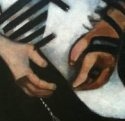|
|
|||||||||||||||||||||
 |
|||||||||||||||||||||
|
Learn Hebrew |
|||||||||||||||||||||
 |
|||||||||||||||||||||
|
Prayer Tutorial |
|||||||||||||||||||||
|
According to Rabbinic tradition, a minyan (an assembly of ten bar-mitzvah men) is required for corporate prayer services (Reform and Liberal Jews give full equality to women and therefore count them as part of a minyan). Most synagogues have a chazzan (cantor) who is a professional or lay-professional singer employed for the purpose of leading the congregation in prayer. |
|
The Morning Service (Shacharit) |
|
This begins very early in the morning. Similar to the evening service, the Shacharit adds Torah reading on Shabbat, holidays, Monday, and Thursday. An addtional service, called a Musaf, is also sometimes added. Bold sections are considered core to the service.
Birkat HaShachar - These additional morning blessings are often recited at the synagogue:
Warm Up for Prayer - The Pesukei d'Zemira (verses of song) section of services include a lot of Psalms and hymns and function somewhat like a "warm-up" for prayers:
The Shema and its Blessings - The Shema functions as a creedal formula for Jews:
The Amidah - The Shemoneh Esrei (or Amidah) is first recited silently, and then is recited again by the cantor:
The Torah Service - Torah reading (Keriat HaTorah) and aliyot (Mondays, Thursdays, and Shabbat) is normally next in the Shacharit seder:
Conclusion - The Shacharit service usually ends with additional prayer and praise:
|
|
The Afternoon Service (Minchah) |
|
This service may occur during the early afternoon or be combined with the ma'ariv service. The Torah is read only on Shabbat and Yom Kippur.
|
|
The Evening Service (Ma'ariv) |
|
Since the Jewish day begins at sundown, this is technically the first prayer service of the day. This service includes preliminary prayers, Shema and its Blessings, Amidah, and Concluding prayers. Friday evening services are called Kabbalat Shabbat.
|
|
|
|
Most siddurim (plural of siddur) contain the prayers for evening (Ma'ariv), morning (Shacharit), and afternoon (Minchah) services for Shabbat, holy days, and weekdays. A machzor is a prayerbook for the High Holy Days (Rosh Hashanah and Yom Kippur). |
|
This page is under construction...
|
|||||||||
|
Hebrew for Christians |
|||||||||
|
|||||||||

